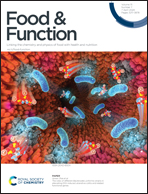Lactobacillus reuteri's multifaceted role in mitigating ionizing radiation-induced injury in Drosophila melanogaster†
Abstract
The numerous beneficial probiotic properties of Lactobacillus reuteri (L. reuteri) include decreasing metabolic syndrome, preventing disorders linked to oxidative stress, improving gut flora imbalances, controlling immunological function, and extending life span. Exposure to ionizing radiation is closely associated with several disorders. We examined the protective and salvaging effects of L. reuteri on ionizing radiation-induced injury to the intestinal tract, reproductive system, and nervous system of Drosophila melanogaster. We also examined its effects on lifespan, antioxidant capacity, progeny development, and behavioral aspects to assess the interaction between L. reuteri and ionizing radiation-induced injury. The findings demonstrated that L. reuteri improved the median survival time following irradiation and greatly extended its lifespan. In addition, it raised SOD activity, reduced ROS levels in intestinal epithelial cells, and increased the quantity of intestinal stem cells. Furthermore, L. reuteri enhanced the adult male flies’ capacity to move. It also successfully safeguarded the generations’ growth and development. L. reuteri dramatically enhanced expression of the AMPKα gene and regulated expression of its pathway-related gene, mTOR, as well as the autophagy-related genes Atg1 and Atg5 in female Drosophila exposed to irradiation. Notably, no prior reports have been made on the possible effects of L. reuteri on injuries caused by irradiation. As a result, our research offers important new information regarding L. reuteri's possible role as a shield against ionizing radiation-induced injury.



 Please wait while we load your content...
Please wait while we load your content...